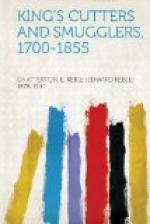In 1786, by the 26 Geo. III. c. 40, section 27, it was made lawful for any commander of any of his Majesty’s vessels of war, or any officer by them authorised, to make seizures without a deputation or commission from the Commissioners of the Customs. Those were curious times when we recollect that apart altogether from the men-of-war of varying kinds, there were large numbers of armed smuggler-cutters, Custom-House cutters with letters of marque, privateers, and even Algerine corsairs from the Mediterranean, in the English Channel. It is to-day only a hundred and fifty years ago since one of these Algerine craft was wrecked near Penzance in the early autumn.
We mentioned just now the Act of George III. which required craft to be licensed. This was another of the various means employed for the prevention of smuggling, and since the passing of this Act those luggers and cutters which engaged in the running of goods endeavoured to evade the Act’s penalties by possessing themselves of foreign colours and foreign ship’s papers. Now, as a fact, by far the greater part of such craft belonged to Deal, Folkestone, and other south-coast ports of England. Their masters were also from the same localities, and very few of them could speak Dutch or French. But for the purpose of evading the English law they got themselves made burghers of Ostend, and notwithstanding that their crews were for the most part English they designated their craft as foreign.
During the year 1785 it happened that two of these pseudo-foreign smuggling craft were chased by an English frigate. Owing to the fact that the frigate had no pilot on board, one of these vessels escaped, but the other, after a chase lasting five hours, realised that she would soon be overhauled. Her master, therefore, threw overboard his cargo as the frigate fast approached, and in company with a number of his crew took to his large boat. The lugger, after no fewer than twenty shots had been fired at her, hove-to. On taking possession of the lugger and examining her papers it appeared that her master’s name was the very English-sounding Thomas March, and yet he described himself as a burgher of Ostend, the vessel being owned by a merchant. The master’s excuse was that he was a pilot-boat cruising with a number of pilots on board, and for this reason it was decided to give him the benefit of the doubt and not detain him. But the frigate’s captain had noticed that before the lugger had hove-to during the evening a part of the cargo had been thrown overboard. The following morning, therefore, he proceeded on board a Revenue cutter, “went into the track where the cargo was thrown overboard,” and was able to find just what he had expected, for he located and drew out of the sea no fewer than 700 half-ankers of foreign spirits.




